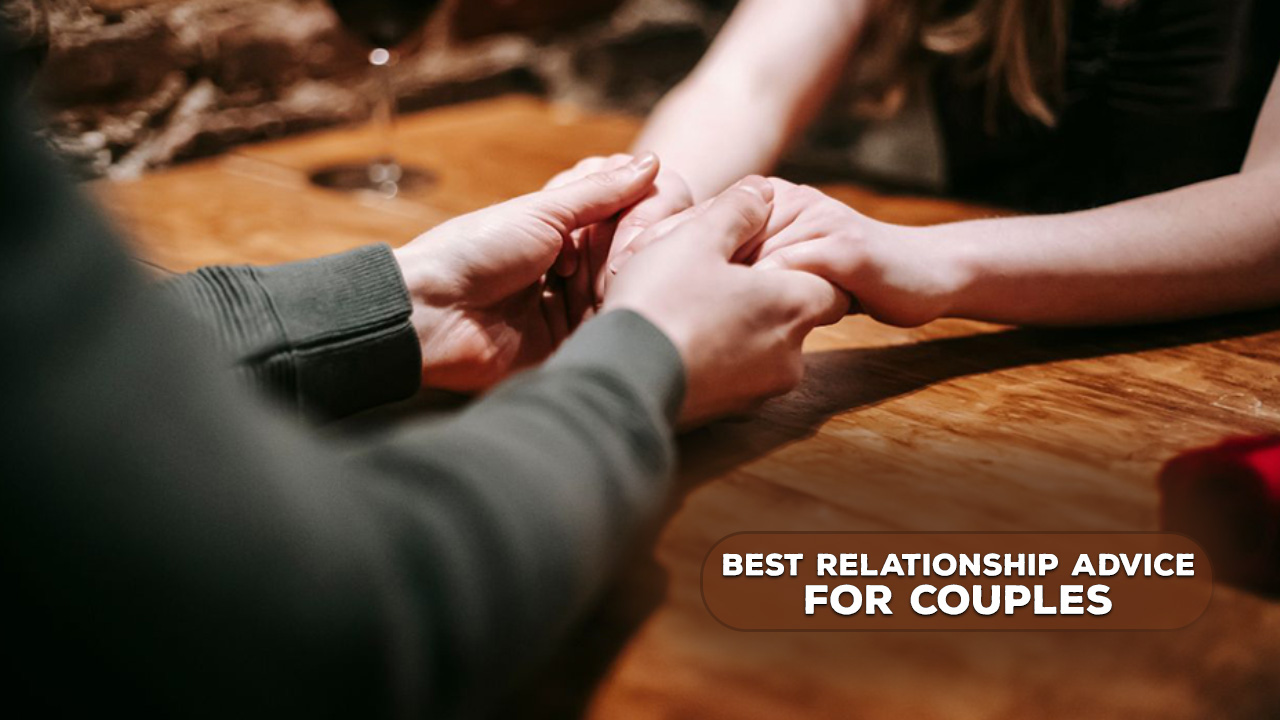Love is a beautiful and complex emotion that forms the foundation of romantic relationships. However, like a delicate garden, it requires consistent care, attention, and nurturing to flourish. While the journey of love can be filled with joy and happiness, it’s not without its challenges. Relationships demand effort, understanding, and commitment from both partners to thrive in the long run.
In this comprehensive guide, we’ll explore 25 of the best pieces of advice for couples looking to strengthen their bond, deepen their connection, and cultivate lasting happiness together. These tips are drawn from relationship experts, psychologists, and years of research into what makes partnerships successful. Whether you’re in a new relationship or have been together for decades, these insights can help you build a more fulfilling and harmonious life with your partner.
Remember, every relationship is unique, and what works for one couple might not work for another. The key is to find the strategies that resonate with you and your partner, and to implement them consistently with love and patience.
1. Communicate Openly and Honestly
Communication is the lifeblood of any healthy relationship. It’s not just about talking; it’s about expressing yourself clearly and listening attentively. Open and honest communication builds trust, fosters understanding, and prevents misunderstandings that can lead to conflicts.
Tips for better communication:
- Set aside regular time to talk without distractions
- Use “I” statements to express your feelings without blaming
- Be specific about your needs and concerns
- Avoid making assumptions; ask for clarification when needed
- Practice active listening by giving your full attention and repeating back what you’ve heard
Remember, it’s not just about the words you say, but also how you say them. Your tone, body language, and facial expressions all play a role in effective communication.
2. Show Appreciation Daily
In the hustle of daily life, it’s easy to take your partner for granted. However, regularly expressing appreciation can significantly boost relationship satisfaction. A study by the University of Georgia found that gratitude was the most consistent predictor of marital quality.
Ways to show appreciation:
- Say “thank you” for both big and small gestures
- Leave surprise notes expressing your gratitude
- Compliment your partner in front of others
- Acknowledge the effort behind their actions, not just the results
- Keep a gratitude journal about your partner
By focusing on the positive aspects of your relationship and expressing thankfulness, you create a culture of appreciation that strengthens your bond.
3. Respect Each Other’s Boundaries
Healthy boundaries are crucial for maintaining individuality within a relationship. They help prevent resentment and foster mutual respect. Boundaries can be physical, emotional, or related to time and space.
How to establish and respect boundaries:
- Communicate your limits clearly and calmly
- Ask about your partner’s boundaries and honor them
- Don’t take it personally if your partner needs alone time
- Discuss and agree on privacy expectations (e.g., phone usage, social media)
- Respect differences in comfort levels with physical affection or social situations
Remember, good boundaries don’t push people apart; they bring people closer together by creating a safe space for both individuals to be themselves.
4. Practice Active Listening
Active listening goes beyond just hearing words; it involves fully concentrating on what is being said and responding thoughtfully. This skill is crucial for understanding your partner’s perspective and making them feel valued.
Steps to improve active listening:
- Give your full attention (put away phones and other distractions)
- Make eye contact and use encouraging body language
- Don’t interrupt; wait for natural pauses to ask questions
- Reflect back what you’ve heard to ensure understanding
- Validate their feelings, even if you disagree with their point of view
By truly listening, you create a safe space for open communication and deeper emotional connection.
5. Keep Dating Each Other
The early stages of a relationship are often filled with excitement and novelty. As time passes, it’s important to keep that spark alive by continuing to date each other. Regular date nights can help maintain romance and prevent the relationship from falling into a rut.
Ideas for keeping the romance alive:
- Plan surprise outings or adventures
- Try new activities together (cooking classes, dance lessons, etc.)
- Recreate your first date or other significant moments in your relationship
- Have regular technology-free date nights
- Take turns planning dates to share the responsibility
Remember, dates don’t have to be expensive or elaborate. The key is spending quality time together and creating new shared experiences.
6. Be Supportive of Each Other’s Goals
Supporting your partner’s personal goals and dreams is crucial for a healthy relationship. It shows that you care about their happiness and success, not just within the relationship but as an individual.
Ways to show support:
- Ask about their goals and aspirations regularly
- Offer encouragement during challenging times
- Celebrate their achievements, big and small
- Help brainstorm solutions to obstacles they face
- Be willing to compromise or adjust your own schedule to accommodate their pursuits
By being each other’s cheerleader, you create a partnership where both individuals can grow and thrive.
7. Learn to Compromise
In any relationship, there will be times when you and your partner disagree. The ability to find middle ground and compromise is essential for resolving conflicts and moving forward together.
Tips for effective compromise:
- Focus on understanding each other’s needs and concerns
- Be willing to let go of less important issues
- Look for win-win solutions where both partners feel satisfied
- Avoid keeping score or holding past compromises over each other
- Be open to trying new approaches or solutions
Remember, compromise doesn’t mean one person always giving in. It’s about finding solutions that work for both partners.
8. Forgive and Let Go of Small Issues
Holding onto minor grievances can create a negative atmosphere in your relationship. Learning to forgive and let go of small issues prevents resentment from building up over time.
Strategies for forgiveness:
- Ask yourself if the issue will matter in a week, a month, or a year
- Practice empathy by trying to understand your partner’s perspective
- Communicate about the issue, then consciously choose to move past it
- Focus on the positive aspects of your partner and the relationship
- If needed, seek professional help to work through forgiveness for larger issues
Remember, forgiveness is a gift you give yourself as much as your partner. It frees you from negative emotions and allows your relationship to heal and grow.
9. Show Physical Affection
Physical touch is a powerful way to communicate love and maintain connection. It releases oxytocin, often called the “love hormone,” which can increase bonding and reduce stress.
Ways to incorporate more physical affection:
- Hold hands while walking or watching TV
- Offer a hug or kiss when greeting or saying goodbye
- Give spontaneous back rubs or foot massages
- Cuddle before going to sleep or upon waking
- Engage in non-sexual touching throughout the day (e.g., a gentle touch on the arm)
Remember to respect your partner’s boundaries and preferences when it comes to physical affection. Some people may prefer less touch, and that’s okay too.
10. Maintain Your Own Identity
While it’s important to build a life together, maintaining your individual identity is crucial for a healthy relationship. Having your own interests, friendships, and goals keeps you fulfilled as a person and makes you a more interesting partner.
Ways to maintain individuality:
- Pursue hobbies and interests separate from your partner
- Maintain friendships outside of the relationship
- Set personal goals and work towards them
- Take solo trips or attend events on your own occasionally
- Share your individual experiences with your partner
By maintaining your sense of self, you contribute more to the relationship and avoid becoming overly dependent on your partner for happiness and fulfillment.
11. Practice Empathy
Empathy involves putting yourself in your partner’s shoes and trying to understand their feelings and perspective. It’s a crucial skill for building emotional intimacy and resolving conflicts.
How to develop empathy:
- Listen without judgment when your partner shares their feelings
- Ask questions to better understand their point of view
- Validate their emotions, even if you don’t agree with their thoughts or actions
- Share in their joys and sorrows genuinely
- Consider how your actions might affect your partner before you act
By practicing empathy, you create a supportive environment where both partners feel understood and valued.
12. Be Trustworthy and Reliable
Trust is the foundation of any strong relationship. Being trustworthy and reliable means your partner can count on you to keep your word and be there when they need you.
Ways to build trust:
- Follow through on your commitments, big and small
- Be punctual and respectful of your partner’s time
- Be honest, even when it’s difficult
- Admit your mistakes and take responsibility for your actions
- Respect agreed-upon boundaries and expectations
Remember, trust is built over time through consistent actions. Once broken, it can be challenging to rebuild, so prioritize maintaining trust in your relationship.
13. Laugh Together Often
Shared laughter is a powerful bonding experience. It releases endorphins, reduces stress, and creates positive shared memories. Couples who laugh together often report higher levels of relationship satisfaction.
Ways to incorporate more laughter:
- Watch comedy shows or movies together
- Share funny stories or jokes
- Engage in playful activities or games
- Don’t be afraid to be silly or goofy with each other
- Find humor in everyday situations
Remember, it’s important to laugh with your partner, not at them. Avoid humor that comes at the expense of your partner’s feelings.
14. Handle Conflicts Calmly
Conflict is a normal part of any relationship, but how you handle it can make or break your partnership. Approaching disagreements calmly and respectfully is key to finding solutions and growing closer.
Tips for handling conflicts:
- Take a break if emotions are running high; agree to revisit the issue when you’re both calm
- Use “I” statements to express your feelings without blaming
- Focus on the current issue rather than bringing up past grievances
- Look for areas of agreement and common ground
- Be willing to apologize and forgive
Remember, the goal of conflict resolution is not to win, but to understand each other better and find mutually satisfactory solutions.
15. Practice Gratitude
Cultivating gratitude in your relationship can significantly increase satisfaction and happiness. It helps you focus on the positive aspects of your partner and your life together.
Ways to practice gratitude:
- Keep a gratitude journal about your relationship
- Share one thing you’re grateful for about your partner each day
- Write thank-you notes for specific things your partner does
- Reflect on how your life has improved because of your relationship
- Express appreciation for your partner’s qualities, not just their actions
By regularly practicing gratitude, you create a positive atmosphere in your relationship and train your mind to notice the good more often.
16. Be Intimate Regularly
Physical intimacy is an important aspect of most romantic relationships. It’s not just about sex, but about maintaining a physical and emotional connection.
Tips for maintaining intimacy:
- Communicate openly about your desires and needs
- Make time for physical affection, even when you’re busy
- Be willing to try new things to keep the excitement alive
- Focus on emotional intimacy as well as physical
- Address any issues or discomfort promptly and compassionately
Remember, the frequency and type of intimacy that’s right for your relationship may be different from others. The key is finding what works for both partners.
17. Create Shared Goals
Working towards common objectives can bring couples closer together and provide a sense of shared purpose. These goals can be short-term or long-term, big or small.
Ideas for shared goals:
- Plan a dream vacation together
- Start a savings plan for a major purchase (like a house)
- Take up a new hobby or skill as a couple
- Set health and fitness goals to tackle together
- Work on a home improvement project
By creating and pursuing shared goals, you strengthen your teamwork and create exciting shared experiences.
18. Be Each Other’s Best Friend
While romantic love is important, a strong friendship forms the backbone of lasting relationships. Being best friends means supporting each other, enjoying each other’s company, and having each other’s backs.
Ways to strengthen your friendship:
- Share your thoughts, fears, and dreams openly
- Engage in activities you both enjoy
- Be there for each other during tough times
- Celebrate each other’s successes
- Make each other laugh and have fun together
Remember, your partner should be someone you genuinely like and enjoy spending time with, not just someone you’re attracted to.
19. Show Random Acts of Kindness
Small, unexpected gestures of love and kindness can go a long way in keeping the romance alive and showing your partner you care.
Ideas for random acts of kindness:
- Prepare their favorite meal as a surprise
- Leave a loving note in their lunch or on their pillow
- Take care of a chore they usually do
- Bring home their favorite treat
- Give a spontaneous massage after a long day
These little acts of love show your partner that you’re thinking of them and appreciate them.
20. Keep Learning About Each Other
People change and grow over time. Staying curious about your partner and continuing to learn about them keeps the relationship fresh and exciting.
Ways to keep learning about each other:
- Ask open-ended questions about their thoughts and feelings
- Try new experiences together to discover new sides of each other
- Revisit old conversations about dreams and goals to see what’s changed
- Share articles or books that interest you and discuss them
- Be open to changing your mind about your partner as you learn more
By staying curious, you prevent the relationship from becoming stagnant and continue to deepen your connection.
21. Respect Differences
No two people are exactly alike, and those differences can be a source of strength in a relationship. Respecting and valuing your partner’s unique qualities and viewpoints is crucial for a harmonious partnership.
How to respect differences:
- Acknowledge that different doesn’t mean wrong
- Appreciate the strengths your partner’s differences bring to the relationship
- Be open to learning from your partner’s perspective
- Avoid trying to change your partner to be more like you
- Find ways to complement each other’s strengths and weaknesses
Remember, the goal isn’t to agree on everything, but to respect and value each other’s uniqueness.
22. Practice Financial Transparency
Money is one of the most common sources of conflict in relationships. Being open and honest about finances can prevent misunderstandings and build trust.
Tips for financial transparency:
- Have regular discussions about your financial situation
- Create a shared budget and financial goals
- Be honest about debts and spending habits
- Make major financial decisions together
- Consider combining some finances while maintaining some financial independence
Remember, financial transparency doesn’t necessarily mean sharing all accounts. It’s about being open, honest, and working together towards common financial goals.
23. Make Time for Self-Care
Taking care of yourself is crucial for being a good partner. When you’re stressed, exhausted, or unfulfilled, it’s harder to be present and supportive in your relationship.
Self-care strategies:
- Maintain a healthy diet and exercise routine
- Get enough sleep and rest
- Pursue hobbies and interests that fulfill you
- Practice stress-management techniques like meditation or yoga
- Seek professional help if you’re struggling with mental health issues
Remember, self-care isn’t selfish. By taking care of yourself, you’re better equipped to care for your relationship.
24. Create Rituals and Traditions
Shared rituals and traditions create a sense of belonging and continuity in a relationship. They provide something to look forward to and create lasting memories.
Ideas for relationship rituals:
- Have a weekly date night
- Celebrate monthly anniversaries
- Create holiday traditions unique to your relationship
- Have a special way of saying goodbye or goodnight
- Take an annual trip to a meaningful place
These rituals don’t have to be elaborate; the important thing is that they’re meaningful to you as a couple.
25. Seek Help When Needed
Sometimes, despite your best efforts, you might face challenges in your relationship that are hard to overcome on your own. Seeking professional help is a sign of strength and commitment to your relationship.
When to consider couples therapy:
- When you’re stuck in repetitive conflicts
- If there’s a breakdown in communication
- After a major life change or crisis
- If trust has been broken
- When you want to strengthen an already good relationship
Remember, couples therapy isn’t just for relationships in crisis. It can also help good relationships become great.
Conclusion
Building a strong, happy, and lasting relationship requires consistent effort, patience, and dedication from both partners. By implementing these 25 pieces of advice, you can create a relationship filled with love, respect, and mutual understanding.
Remember that every relationship is unique, and it’s important to find what works best for you and your partner. Be patient with each other as you grow and learn together. With time and effort, you can build a relationship that not only withstands the test of time but continues to bring joy and fulfillment to both partners.
Ultimately, the key to a successful relationship lies in the daily choices you make to love, respect, and support each other. By making these positive choices consistently, you create a strong foundation for a lifetime of love and happiness together.




















